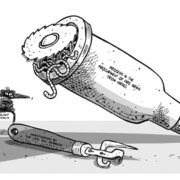THE tragedy of 9/11 will forever be etched in the memories of billions of people all over the world.
On the morning of September 11, 2001, news of passenger planes crashing into the Twin Towers of the World Trade Center, the Pentagon and an open field in Pennsylvania shook the world.
The world watched in terror as nearly 3,000 people, from over 70 countries were killed.
11 years later, the echoes of 9/11 still reverberate across the world. We still commemorate this day in honor of the victims and heroes of the worst terrorist attack in US soil.
The attacks of September 11 also became a wake up call, reminding us that terrorism can strike anyone, anywhere at anytime.
Governments have since then asked the United Nations to assume a key role in the multilateral counterterrorism effort, with the Security Council and its various counterterrorism-related bodies at the forefront.
Peace doesn’t happen overnight. Because of this, different governments continue to demonstrate their resolve to end the scourge of terrorism in the world.
Cognizant of the major challenges posed by terrorists, the Philippine government submits to international conventions and initiatives against terrorism, and contributes in endeavors intended to bolster international cooperation.
As an active member of the United Nations, the country is committed to prevent, suppress and counter all forms of terrorist acts.
The Philippines is no stranger to terrorism. The country had suffered immensely in the hands of terrorists.
In the past, the country was second to US, in the biggest number of fatalities caused by terrorism worldwide (not counting Iraq and other war-torn states).
Peace talks have been intensive and full-time to achieve success in the Philippines.
Because peace can’t be negotiated part-time, during negotiations 200-300 people at a time work every day, every week, every month, every year, until an agreement is made
So far, the MILF offered a positive assessment of Aquino’s possible policy on the over 15-year peace talks with the government.
As this developed, peace negotiators reached what they described as “the final, crucial stages of negotiations” with the Moro Islamic Liberation Front (MILF).
In a recent statement released by the Office of the Presidential Adviser on Peace Process (OPAPP), state peace adviser Teresita Quintos Deles said the Government of the Philippines (GPH) peace panel still “remains cautiously optimistic on the prospects of signing a GPH-MILF peace agreement this year.”
She said such optimism stemmed from the “strong desire from both sides of the table to sign a peace agreement in the earliest possible time.”
Not only does such lofty and ambitious undertaking require foresight, resoluteness, and political will. In the quest for peace, all parties involved must also weather pressures of those vested interest groups, which solely seek to control an existing system or activity from which they derive private benefit.
It is important for everyone to be reminded that we can never truly contribute in the pursuit of peace, for our country and the world, unless there is peace within us.
Confronting this challenge is beyond the power of governments alone. Today’s terrorism will only be defeated with the engagement of the public and on the basis of common values.
These values are based on respect for the sanctity of life, democracy and human rights. This is why the promotion and protection of human rights, regardless of nationality or creed, is core element to the prevention of terrorism.
The task is no doubt high, and expectations from every Filipino and international spectator is growing by the day. The tendency to form the Philippines as a citadel of peace should be worth all the risk and the effort.
The world is keeping its fingers crossed, waiting to see how the next events will unfold in these days, full of daunting national security challenges.
(www.asianjournal.com)
(LA Midweek September 12-14, 2012 Sec A pg. 8)






